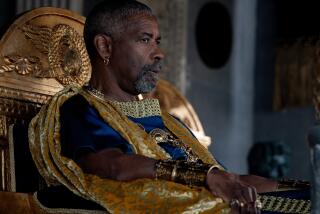Guillermo del Toro wanted ‘Trollhunters’ to feel like it was from the ‘80s
- Share via
Director Guillermo del Toro certainly knows his monsters. He’s choreographed battles between kaijus and giant robots; guided the heavy fist of Hellboy; filmed vampires, ghosts, even mythical fauns. But the creator’s next monstrous muse is something a little more common, the troll.
In the world of creatures, trolls are so hot right now. There’s Laika’s “The Boxtrolls,” the stone trolls from “Frozen,” the cave troll from “The Hobbit” and even a new Dreamworks feature film simply called “Trolls.” This weekend, Del Toro will be the next to touch on the troll craze with the new Netflix series he’s producing, “Trollhunters.”
So why did these particular brand of beasties appeal to the monster movie maker?
“They have a darkness and a brutality that is really amusing, rather than menacing,” says Del Toro. “And their mythology is surprisingly well known.”
Of course the new “Trollhunters” world won’t be limited to just one creature, “[The trolls] are a gateway into other creatures. We have goblins; we have gnomes. As the series progresses — oh, we have pixies!”
The promise of pixies is not all Del Toro is offering in his new show; “Trollhunters” also strives to revive the nostalgic sense of adventure.
“It’s a throwback in a way to the things I watched as a kid — shows like ‘Jonny Quest,’” says Del Toro. “It really goes into very interesting places in the 26 episodes.” The Dreamworks Animation original series is the first from Netflix to receive such a large episode order.
The new animated hero introduced in “Trollhunters” is a kid named Jim Lake Jr. (who was voiced by the recently deceased actor Anton Yelchin). Thanks to a mystical amulet, Jim discovers a secret, underground troll civilization that he’s now tasked with protecting.

Del Toro, who is in post-production on “The Shape of Water” and filming “Pacific Rim: Uprising,” expanded on his desire for a throwback tone.
“I find that as an adult, I enjoy the fact that we are living in a golden era for animation on TV. We have really really super smart, self-reflective, great modern ironic shows that are fantastic. But I find sort of a nostalgia in a desire to find shows that combine that with a sense of adventure that was really earnest and un-ironic that I experienced as a kid.”
The show — which also features the voices of Kelsey Grammer, Steven Yuen and longtime Del Toro star Ron Perlman — brought in exciting talent to the executive producing ranks, including “Arrow’s” Marc Guggenheim along with Dan Hageman and Kevin Hageman from “The Lego Movie.” Guggenheim, who wrote the first couple of episodes of the series alongside Del Toro, echoes the director’s view of the “Trollhuters” tone.
“‘Trollhunters’ owes a lot to the Amblin movies of the 1980s, and you know, five years ago, ‘Stranger Things’ wasn’t even a gleam in the Duffer Brothers’ eyes, yet that’s in the zeitgeist now,” says Guggenheim. “One of the things that we were going for was a level of sophistication in the storytelling that would appeal to kids, but would also appeal to adults.”
But the quest to revive that adventurer spirit would come to a halt after the tragic death of actor Yelchin. Del Toro was distraught and forced himself to “disconnect” from the production for a month or so.
“It really felt like a much more intimate loss than I would’ve thought,” says the director. “I admired Anton as a person and a true artist. He was very much what I would’ve loved to be when I was his age. He was a reverse role model.”
“Once it really set in, it was incredibly devastating,” says Guggenheim. “Anton was such a warm generous spirit. He was such an old soul, and, let’s be honest, just tragically young.”
The series, though, did continue, with Yelchin’s performance still intact (although, according to Cinemablend, another actor was brought in to finish the lines Yelchin wasn’t able to complete).
As for the look of “Trollhunters,” Del Toro’s touches of purple and blue is all over this Netflix series. The show molded the characters to look almost like vinyl using Del Toro’s unique style.
“I wanted to make a show that was not lit like a sitcom; I wanted to light it like a movie. We’re not trying to strive for the impossible to reach the hyperrealism of a $150-million production [though],” Del Toro says.
“This project started out as a movie, and all the visual development was done back when it was a movie,” Guggenheim says. “I don’t think we shed our roots when the movie became a show. As a result, it kind of looks like 26 episodes of a feature film.”
See the most-read stories in Entertainment this hour >> »
Follow me on Twitter: @Storiz
More to Read
The biggest entertainment stories
Get our big stories about Hollywood, film, television, music, arts, culture and more right in your inbox as soon as they publish.
You may occasionally receive promotional content from the Los Angeles Times.











